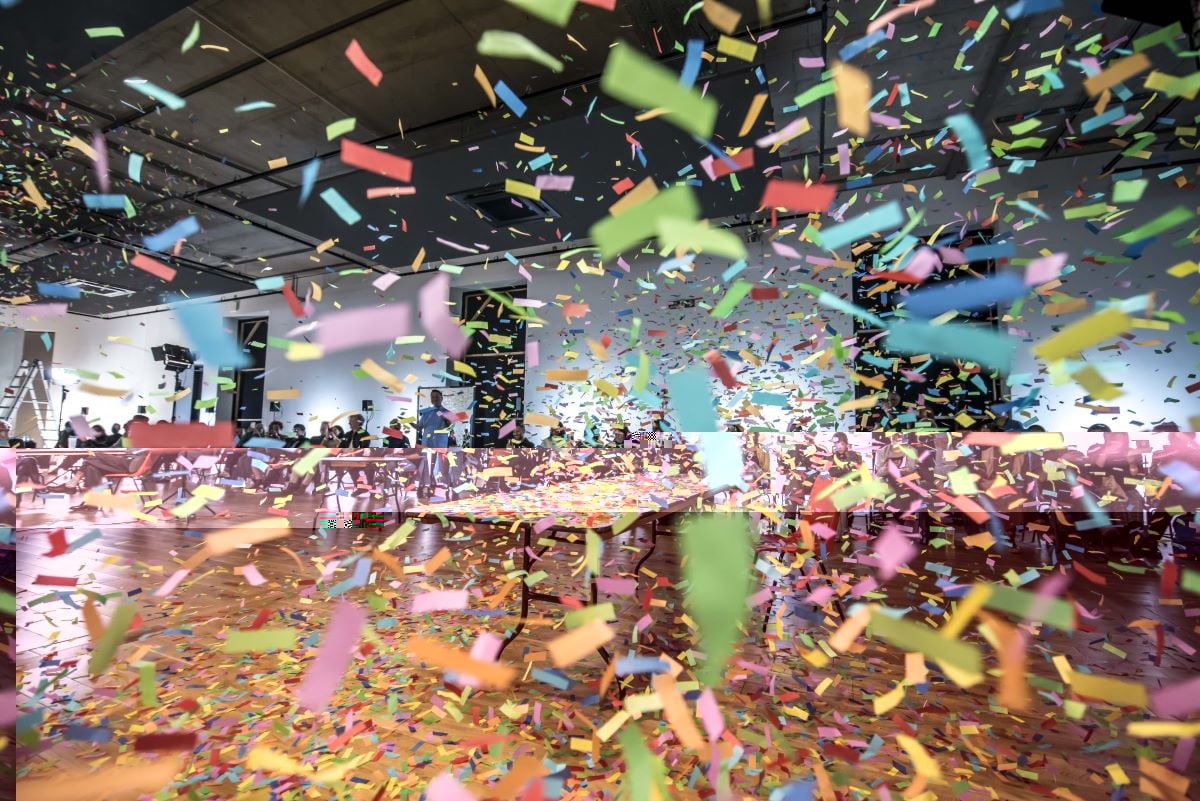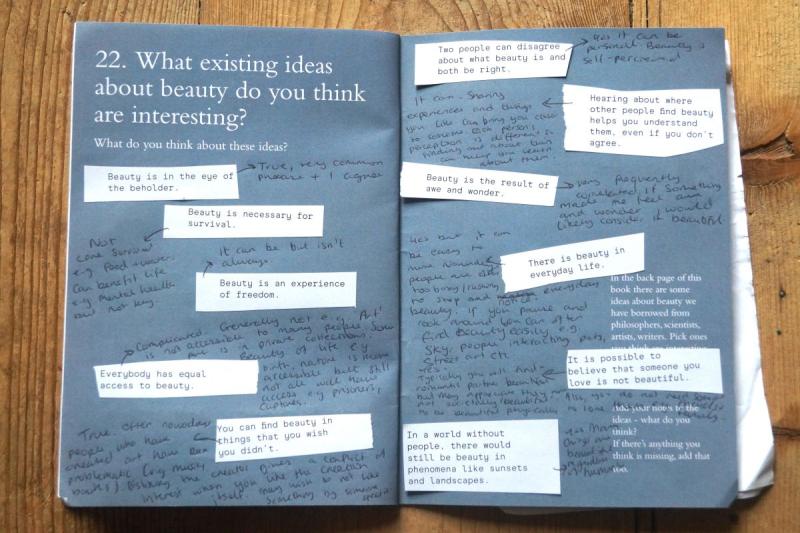
Quarantine's 12 Last Songs, at HOME Theatre Manchester, was used as a case study in the research
Photo: Chris Payne
Has beauty become a dirty word?
Artist Sarah Hunter, physicist Rox Middleton and philosopher Lucy Tomlinson spotlight what they learnt from spending a year exploring the cultural value of beauty.
Read the Arts Council’s latest 10-year strategy and you might think beauty is a concept that dare not speak its name. Over 42 pages, it isn’t mentioned once.
A desire for beauty is a vital part of why Quarantine, a group of artists who create and engage with live performance, wanted to take part in collaborative research with a physicist and a philosopher funded by the Centre for Cultural Value. The result is The Beauty Project.
We were curious to understand the value of beauty in an increasingly evaluation-driven arts ecology. We didn’t want to revive the stale dichotomy of aesthetics versus participation. Rather we wanted to explore ways audiences might articulate their own experiences of beauty.
Why don’t we talk about beauty?
In a world where we rightly look at diversity, impact and accessibility as crucial, does beauty sound – well – a bit old-fashioned? Is there room for beauty when we need to address huge, concrete problems like social injustice or climate change?
One reason beauty gets sidelined in policy and funding priorities is the difficulty of its evaluation. Evaluation allows us to interact with funders, but the intangibility of beauty isn’t easily condensed to statistical summaries. In addition, beauty is often equated with elitism and a didactic approach to arts: the stereotype of the philosopher in solitary contemplation pronouncing from on high about the nature of beauty.
Using Quarantine’s 12 Last Songs as a case study, we worked with audiences as experts in their own experience, with the aim of developing a language for talking about beauty, and to explore whether we could understand and articulate its value. We didn’t impose a predetermined definition of beauty. Instead, we left the identification and articulation of the experience up to the audience.
Alongside the arts research, we looked at beauty in science, which showed contrasts and confluences. We’ll concentrate here on the research relating to live performance, but you can see the findings side by side on the project website.
 Participants used bespoke lab books to record their own experience
Participants used bespoke lab books to record their own experience
The value of qualitative data
We started by thinking about ways to discuss value. There were obvious metrics suggested by psychological studies in which experiencing beauty is treated as a physiological effect – hearts racing, sweaty palms, stillness. But we felt that this positioned the audience as passive, having art ‘act upon them’. We wanted to treat the audience as experts interacting with the work and making meaning from it.
We looked at documentation technology used by scientists to record, contemplate and explore research: the lab book. We asked our beauty experts to carry out their own investigations, like the philosophers of abstract beauty, but in relation to real experience. We created bespoke lab books with questions as prompts and sent them to audiences who’d seen 12 Last Songs during the 2021/22 UK tour and self-selected to take part. Then we waited.
And a miraculous thing happened: participants sent back responses, each unique, fantastically rich, and beautiful. The process of analysing the responses showed us the value of this interaction: it wasn’t stars ratings, it was genuine reflection.
Listening to the language of beauty
All our respondents but one identified moments of beauty they’d experienced in 12 Last Songs, suggesting beauty is something that can remain, despite the inherent ephemerality of live performance. More than that, the beauty experiences could be described; they weren’t intangible and abstract, they were real and shareable.
Given space, audience members were able to define beauty and to talk about their experiences in vibrant and nuanced ways. From the responses of our participants, we’ve built a collective, complex narrative about where beauty is found and how it affects us.
We put philosophical theories of beauty in dialogue with the responses gathered and found the idea of beauty was expanded and diversified. By grouping the collected beauty experiences into themes and creating 'beauty maps' we explored commonalities and differences in where and how people experienced beauty. We began to develop a language to understand and articulate what we learn about performance (and science and life) when we use beauty as a lens.
A new understanding of evaluation
This approach was time-intensive for participants and sparked debate about the voices and ideas we weren’t capturing. Reading the qualitative data gathered was also time-intensive for us. We couldn’t have done this exploration without dedicated, funded project time.
But we were delighted by our progress. It has been meaningful for Quarantine to learn how audiences found value in the work through beauty, and how it expanded their contact with beauty beyond their everyday experience. This in-depth, purposeful evaluation couldn’t have come from tick-box monitoring forms or quantitative scales. We’re now in the early stages of thinking how we might build this kind of evaluation with audiences into future projects.
The Beauty Project is a call to the wider sector to think carefully about evaluation and where we place value in the arts. Our approach isn’t intended as a new cookie-cutter method to evaluate projects. We don’t imagine audiences would respond with such generosity if asked to do this after every engagement with the arts, and we are reluctant for beauty to become simply another box on an evaluation form.
However, in doing this research and in reading the responses and expertise of our audiences, we felt a landscape opening up in understanding the affective value of culture. We hope this can act as the beginning of a conversation and encourage funders, organisations and practitioners to ask: why and for whom do we create, reflect and evaluate?
Sarah Hunter is an Artist and Producer at Quarantine, Manchester.
Rox Middleton is a Research Fellow at Technische Universität Dresden and University of Bristol.
Lucy Tomlinson is freelance writer and researcher.
![]() culturalvalue.org.uk/ | qtine.com | thebeautyproject.site/
culturalvalue.org.uk/ | qtine.com | thebeautyproject.site/
![]() @valuingculture | @QtineMcr | @roxmiddleton
@valuingculture | @QtineMcr | @roxmiddleton
Interested in value-driven evaluation in the arts, culture and heritage sectors? Explore the Centre for Cultural Value’s co-created Evaluation Principles.
This article, sponsored and contributed by the Centre for Cultural Value, is part of a series supporting an evidence-based approach to examining the impacts of arts, culture and heritage on people and society.
Join the Discussion
You must be logged in to post a comment.